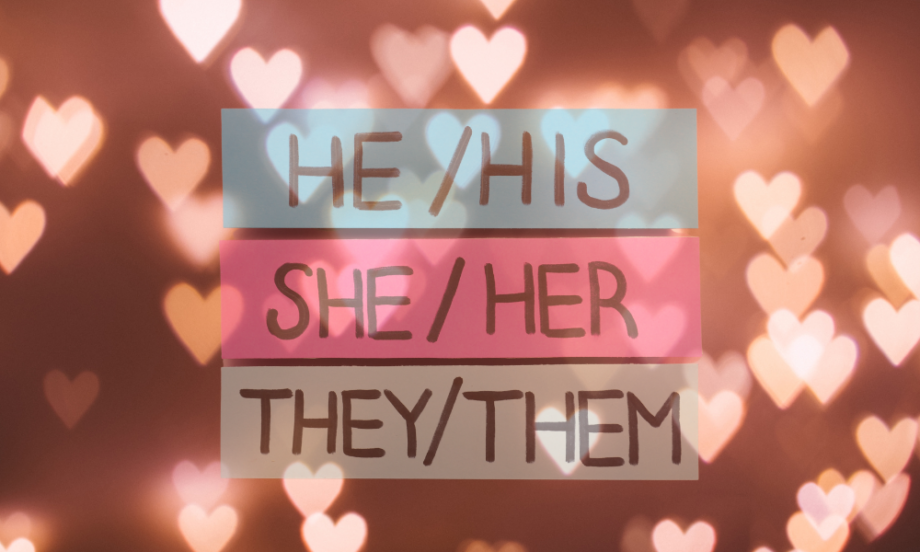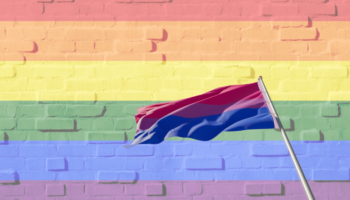About a year and a half ago, I came out as non-binary and started using they/them pronouns. All the people closest to me were extremely accepting, and I’m eternally grateful for their support. I know that a lot of people whose gender identity doesn’t match their gender assigned at birth don’t get that kind of acceptance when they start living and embodying their authentic selves. Some even get ostracized by family and friends who can’t accept them for who they really are. So, I know how lucky I am that my bio family, chosen family and friends all told me they were happy I was finally living my truth.
As I’ve lived in my true gender identity – not as a woman or a man, but a more masculine presenting person – I’ve learned that although everyone in my life accepts this shift in my gender identity, not everyone embraces it. And there’s a big difference between accepting who I am and embracing who I am.
Accepting vs. Embracing Gender Identity
The people who embrace that I’m non-binary have rearranged their whole interpretation of who I am. They don’t see me as a girl or woman anymore, even if they’ve known me as a girl or a woman for years. They see me as the non-binary person I am without their own conceptions or society’s conceptions of gender or their vision of me as a woman clouding their perception.
The people who simply accept that I’m non-binary haven’t changed their interpretation of who I am at all. They don’t have a problem with my shift in gender identity. They don’t care about or love me any less because of this shift in my gender identity. And because they love me so much, they believe me when I say I’m non-binary and they accept me as I am.
But ... their ideas about gender and their beliefs about who I am based on their previous experiences with me prevent them from changing their interpretation of who I am. So, they still see me as a girl or a woman, even though I’ve made it clear that I’m not.
They still see me as a girl or a woman, even though I’ve made it clear that I’m not.
Noticing How People Perceive My Gender
The distinction between the people who embrace my gender identity and those who just accept it wasn’t immediately clear because no one said anything to me directly. But, over time, I noticed that the way people spoke to me and about me clearly indicated how they perceived my gender.
A small group of my closest people started using “they/them” and stopped using gendered language almost immediately. I didn’t expect anyone to adjust that quickly. I knew it would be difficult for people to change the gendered language and pronouns they’d been used to for years, or decades in some cases. But this small group of people adjusted almost seamlessly, and rarely messed up. When they did, they immediately corrected themselves and moved on.
I was impressed by their commitment to honoring my authentic self and their love for me, but I was also perplexed by the ease of their adjustment. The shift felt monumental to me, and I was still acclimating myself. How had they pivoted so quickly and assuredly? I figured it had something to do with the fact that this particular subset of people were all queer or queer adjacent. Maybe they were all so used to people coming out as non-binary or trans that changing their gendered language was no big deal.
But when I spoke to a few of them about it, I found out this was only a partial explanation. Each of them, independently of one another, told me that they could see the change in me, and not just because I’d started presenting as more masculine. My energy, my attitude, the way I carried myself – all of this had shifted since I came out as non-binary. No joke, more than one of them told me that I now had a “swagger” that wasn’t present before. They said it seemed like I had settled into myself, like I wasn’t trying so hard anymore, like I was finally comfortable with myself. For them, changing their language was easy because they were seeing a changed person.
They could see the change in me, and not just because I’d started presenting as more masculine. My energy, my attitude, the way I carried myself – all of this had shifted since I came out as non-binary.
Hearing multiple people say this was one of the most affirming and validating experiences of my life. They were describing exactly how I was feeling since coming out, and knowing that they could see it shining through made me feel seen in a way that I’d never experienced before.
People who weren’t as close to me started seeing the shift in me as well. I got message after message saying things along the lines of “Your smile seems so much more genuine these days” or “You just seem so content,” or “You’re practically glowing.” People told me my authentic self was shining through, even in photos.
As it turned out, not everyone in my life could see this shift. Their words gave them away in each interaction. Months after I came out, they still referred to me as “she/her” and used gendered language. Some of them corrected themselves every once in a while, but not consistently. Some of them didn’t even notice that they were misgendering me. Sometimes, they’d apologize when I corrected them and try their best for a bit. Sometimes, they’d apologize and misgender me in the very next sentence. This subset of people I knew invited me to “women only” events and included me in conversations when they wanted “a woman’s perspective.” To them, I was definitely still a woman, regardless of what I told them or how many times I said it.
They weren’t being malicious. They weren’t purposely misgendering me to hurt me. But their words made it clear that they didn’t see me, my authentic self. They couldn’t see past the version of me they had in their heads, the version of me that neatly fit into the gender binary they understood.
They couldn’t see past the version of me they had in their heads, the version of me that neatly fit into the gender binary they understood.
Some of these people have gotten better about using my pronouns and non-gendered language as more time has passed. Some of them haven’t. But none of them have moved from accepting my gender identity to embracing it.
Read: Gender 101: A Guide for the Perplexed
Why Embracing Gender Identity Is About More Than Respecting Pronouns
The larger conversation about gender identity tends to focus on respecting people’s pronouns as the best way to show them that you respect their gender identity, but there’s a huge difference between respecting people’s pronouns and actually respecting their gender identity. You can respect people’s pronouns - and even use the correct pronouns most of the time - and still not respect their gender identity. The idea of respecting people’s pronouns by using them correctly means that you take the action of changing your language because it’s what’s expected of you, it’s polite, or it’s important to someone you care about. But you can also take these actions even if you completely disagree with the fact that gender identity can shift or don’t believe that their gender identity has actually shifted.
In other words, respecting someone’s pronouns and using them correctly does not mean you’ve actually shifted your interpretation of their gender or your perception of them as a person, and that’s a fundamental requirement of actually respecting someone’s gender identity. To truly respect someone’s gender identity, and move from accepting to embracing, you need to see them as the gender they truly are, not the gender you think they are.
Respecting someone’s pronouns and using them correctly does not mean you’ve actually shifted your interpretation of their gender or your perception of them as a person.
Honestly, I don’t really want people to “respect my pronouns.” Yes, I want them to use my pronouns correctly; every time someone misgenders me, it gives me the same tingling anxiety, sharp pain and feeling of wrongness I get when someone rejects me. But what I really want them to focus their time and energy on is shifting how they see me, to start seeing me for who I really am, not who they think I am. I want them to respect my gender identity, not my pronouns.
Read: How Not to Be a Jerk When It Comes to Gender
Where do you fall?
If there are non-binary or trans people in your life, I’m inviting you to reflect on whether you’re actually respecting their gender identity or if you’re just respecting their pronouns. If honest reflection reveals that you’re doing the latter, please, do better.
Robin Zabiegalski (they/them) is a queer, non-binary writer, editor, and movement instructor. They've been writing for Kinkly since 2017, and joined Kinkly's Editorial Team in early 2024. Their writing has also been published on xoJane, Heavy.com, Health Digest, Glam, Women.com, The Establishment, Sexual Being, The Tempest, and several other digital media publications. When Robin isn't writing they can be found practicing or teaching yoga, training or teaching Brazilian Jiu Jitsu, playing Fortnite with their partner or chasing their rambunctious kiddo.




